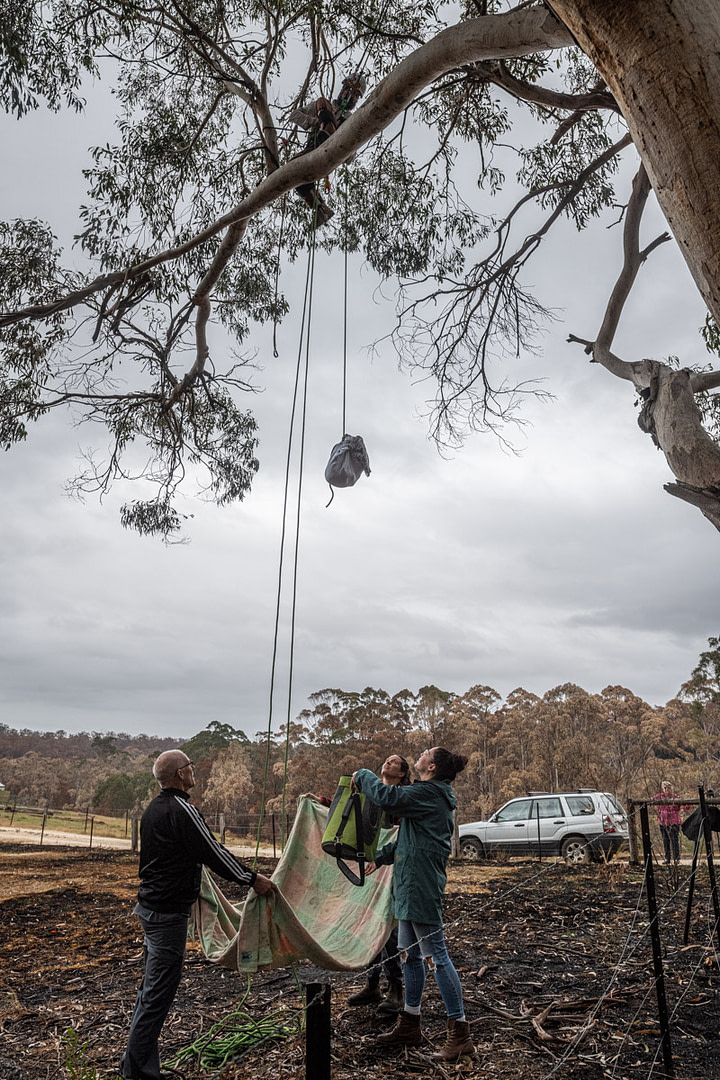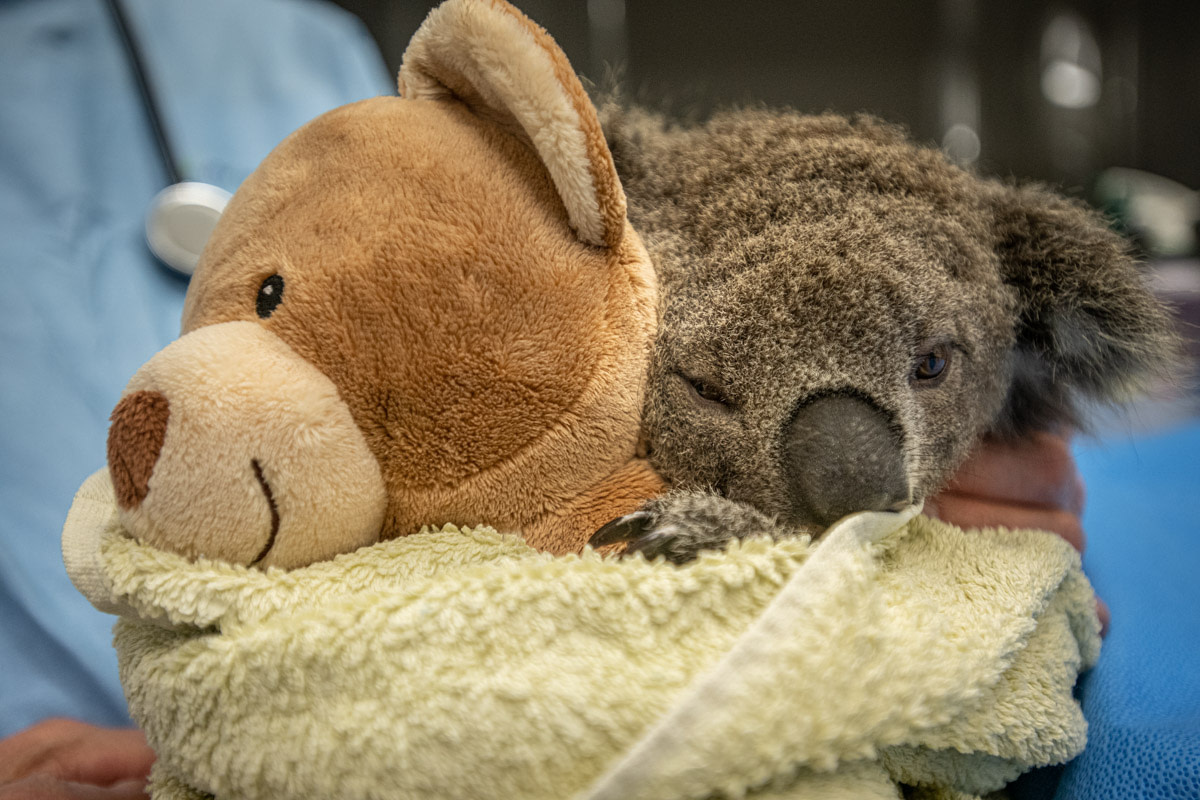Animal Rescuers Provide Hope During Australian Wildfires

An injured and dehydrated koala is captured and lowered from a tree for veterinary care.
To view more images from this story, please visit our Australia Bushfires gallery on the We Animals Archive.

Koalas feel much more secure when they can hold on to something tightly. When koalas need to be examined at Southern Cross Wildlife Care, they give them a teddy bear to cling to. This koala was orphaned in the bushfires and is recovering from wounds.
A billion animals is not a billion animals. A billion animals is one individual, and then another, and then another, and again another.
In fire-ravaged Australia these last several months, they are the kangaroo succumbing to billowing flames and smoke. They are the koala trying to lift her paws from the burning ground below her. They are the steer being euthanized in a field by a distressed farmer.
“Over one billion” seems to be an agreed upon descriptor by scientists and the media with regard to the recent animal deaths in Australia. It’s a number that’s near impossible to get one’s head around, or feel. It’s the same when we speak of people in large numbers. 27 dead in a suicide bombing. 30,000 migrating refugees. 10,000,000 starved during a famine. Our ability to empathize recedes as the numbers increase.

Louise Bonomi with a sedated joey. Curious horses in the pasture came over to investigate.
During natural and climate change disasters, it seems near impossible to be able to organize to address those numbers, but we try.

Veterinarian Chris Barton of Vets for Compassion carries eucalyptus browse into a destroyed eucalyptus tree plantation where surviving koalas perch high in trees. The fresh eucalyptus is tied to the base of trees which lures them down, at which point the rescuers and vets can catch the koala and assess them for injuries.
The animal rescuers and veterinarians that I met in Australia, and the sanctuaries that I visited, are trying. More than trying: doing. With maximum effort and often minimal sleep, they are in the field. Searching. Finding. Devising. Rescuing. Triaging. Treating. Delivering. Saving. And euthanizing humanely, when they feel there is no other way, and that this is the compassionate choice.

Looking for survivors in the Corryong area. If trees are burnt at the bottom, koalas are sometimes up higher in an elbow of the tree.

An injured possum receives treatment at Southern Cross Wildlife Care for severe burns caused by the bushfires.



In this fire-burned landscape, roadblocks to successful rescues are literal and figurative.





Above: Ten rescued and stabilized koalas are delivered from Mallacoota to Melbourne by A Royal Australian Airforce plane. They will go for rehabilitation at zoos and sanctuaries and then be released into the wild with other koalas. Below: A sub-adult wombat is treated for a brain injury and various wounds at Southern Cross Wildlife Care. He was most likely hurt when fleeing the fires.



Injured koalas are transported to an RSPCA triage site in Bairnsdale, Victoria, where they receive treatment for burns, smoke inhalation, and dehydration.
This story documents people across Australia with incredibly big hearts, who continue to fight the odds and do their very best for the individuals who have survived the fires and still need help. Animals are burned and dehydrated, and with so much food and nourishment up in smoke, many are starving. Although media attention is now waning, the crisis continues and help will be needed, ongoing.
These are some of the heroic and successful efforts from people bringing aid to the victims of the fires. I’m grateful for their tenacity and for the hope they bring us all. This brings to mind the David Orr quote, “Hope is a verb with its shirtsleeves rolled up.”

An injured possum in the arms of Dr. Howard Ralph of Southern Cross Wildlife Care. The possum received expert treatment for severe burns to his tail and paws and is recovering well.




Images and text by Jo-Anne McArthur.
To view more images from this story, please visit our Australia Bushfires gallery on the We Animals Archive.
We’re grateful to the following organizations for allowing us to work alongside them and capture their important work during the bushfire crisis:
Animals Australia
Changing the world for animals by exposing cruelty and inspiring compassion through public awareness, investigations, corporate outreach, legal advocacy, and global work.
Southern Cross Wildlife Care
A non-profit, volunteer run Registered Charity dedicated to the treatment and care of wildlife, particularly native animals.
Vets for Compassion
Their vision is to improve animal welfare in Australia and in Asia.
RSCPA Victoria
RSPCA Victoria works to educate the community regarding animal welfare and works with government and industry to ensure the standard of animal welfare and care continues to improve.
Mallacoota Wildlife Shelter
Caring for sick, injured and orphaned native wildlife with the aim to rehabilitate and release them back into the wild.
Edgar’s Mission Farm Sanctuary
Seeking to create a humane and just world for humans and non-humans.
More like this from We Animals Media:
Disaster Response: How Australia Is Failing Its Wildlife
by Anna Mackiewicz | Feb 14, 2020
Australia's Hidden Bushfire Victims
by Anna Mackiewicz | Feb 14, 2020
Sanctuary
by Jo-Anne McArthur | Jan 3, 2019



